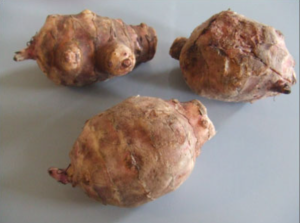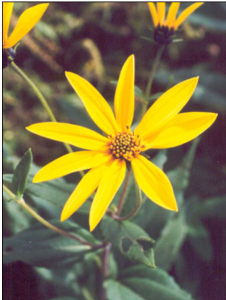The sunchoke (Helianthus tuberosus L.), also known as Jerusalem artichoke is a root vegetable native to parts of North Florida. Let’s talk about the growing requirements of the sunchoke.
Origins of the Sunchoke
Fittingly, the sunchoke is in the same family as sunflowers. Sunchokes grow tall, woody stems with pretty yellow flowers and narrow green leaves. Edible tubers are clustered at the base of each stem. These potato-like structures are specialized storage areas of the stem. The tubers of the sunchoke are fewer in calories than potatoes and store carbohydrates as inulin instead of starch, resulting in a lower hypoglycemic index and higher prebiotic fiber.

Growing Conditions and Characteristics
Sunchokes grow best in USDA Hardiness Zones 3 to 9. They can reach heights of 4 to 10 feet, depending on the variety, and spread about 2 to 3 feet wide. The sunchoke needs well-draining soil and at least 6 hours of full sun each day. Aim to plant these natives in early spring to have a harvest by fall. These plants typically need 120 days of growing time.
The sunchoke is tolerant of heat, drought, and are relatively low maintenance since they require less water and minimal fertilization once established. Their tall, sunflower-like blooms are beautiful and attract pollinators and beneficial insects.

Why Plant Native Species?
While native and non-invasive exotic plants can enhance local ecosystems, invasive-exotic species pose a threat to native flora and disrupt ecological balance. In Florida, invasive species like the Mexican petunia and Brazilian peppertree jeopardize native habitats, making it crucial to select appropriate plants for your landscape. Choosing native plants like the sunchoke supports Central Florida’s local ecology by providing food and habitat for native wildlife while requiring minimal maintenance.
To learn more about invasive plants, click here.
Have a question?
If you have any questions about gardening in Central Florida, please contact UF/IFAS Extension Pasco County at 352-518-0156. For more information on UF/IFAS Extension Pasco County Community Gardens, and how you can join one, visit http://sfyl.ifas.ufl.edu/pasco/. Supervising Agent: Dr. Whitney Elmore.
Follow us!
We have several ways to connect. Visit our Facebook, Instagram, Eventbrite, Blogs, Florida-Friendly Facebook, & Website.
Other Blogs in the Series
- Exploring Florida’s Native Gems: The Black-Eyed Susan
- Exploring Florida’s Native Gems: Beautyberry
- Exploring Florida’s Native Gems: Carolina Jessamine
- Exploring Florida’s Native Gems: The Coontie
- Exploring Florida’s Native Gems: Chickasaw Plum
- Exploring Florida’s Native Gems: The Coreopsis
- Exploring Florida’s Native Gems: Coral Honeysuckle
- Exploring Florida’s Native Gems: The Florida Maple
- Exploring Florida’s Native Gems: The Firebush
- Exploring Florida’s Natives: The Florida Violet
More resources
- UF/IFAS Extension Pasco County
- Dr. Whitney Elmore’s Podcast: Rooted in Florida
- Extension Connection: Florida Friendly Landscaping
Featured image: “Tenacity” by L’eau Bleue is licensed under CC BY-SA 2.0.
 3
3
